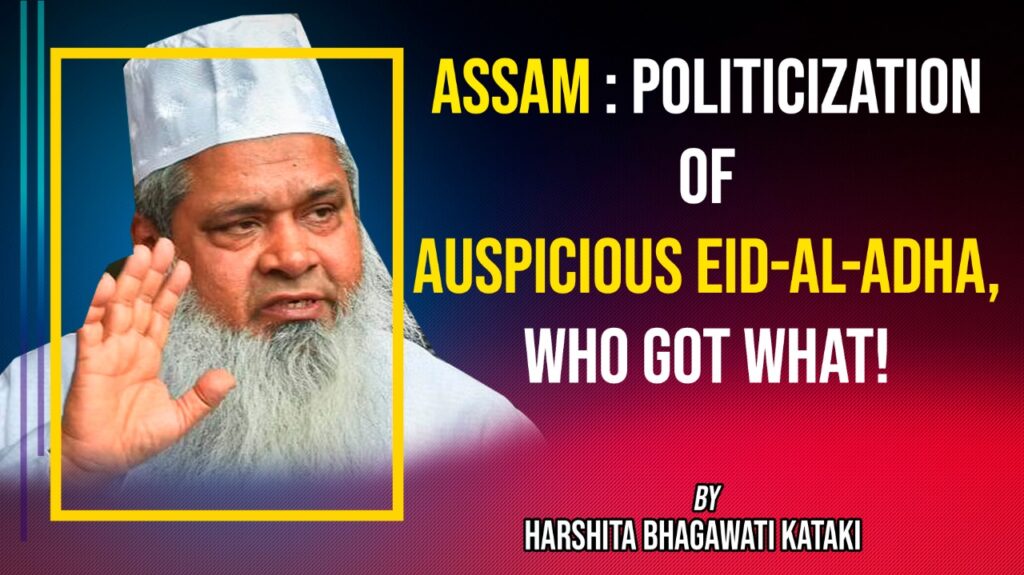Eid al-Adha, also known as Bakrid is regarded as the second most important Islamic holiday celebrated globally every year. It is celebrated with great enthusiasm and a lot of fanfare by Muslims globally. This is known as the Feast of Sacrifice, the festival falls on the tenth day of Dhu al-Hijjah marking the end of the Hajj pilgrimage to Mecca.
Eid al-Adha Date:
This year it will be celebrated from Saturday, July 9 upto Sunday July 10.
Political opinions on the celebrations of Eid:
Since the partition of 1947, India has been at the zenith of political debate on different religious identities. There are different political opinions on religious notions that are put forwarded by many political leaders that have created a conflict of interests among people.
The recent debate that shook the Muslim population of Assam was that of Assam MP and All India United Democratic Front (AIUDF) chief Maulana Badruddin Ajmal reiterated his appeal to Muslims of Assam not to sacrifice cows during this week’s Eid-ul-Adha, “respecting the sentiments” of Hindus.
“Few from RSS (Rashtriya Swayamsevak Sangh) cannot break the unity between Muslims and Hindus in this country. You (Muslims) will not die if you don’t eat cows for one day on Eid. Rather, we celebrate it with Hindu bhais. Our forefathers were all Hindus. They came to Islam because it has special qualities. That is to respect the sentiments of other religions,” Mr Ajmal told reporters in Guwahati, Assam.
But earlier, Mr Ajmal said that performing the “Qurbani” or sacrifice on the occasion of Eid al Adha for those who can afford the ritual is an essential duty of a Muslim.
The rhetoric statements of Hon’ble MP Mr Badruddin Ajmal create skepticism in the minds of people of Assam, leaving a big question mark on Muslims who have been perfoming “Qurbani” as a symbol of religious practice.
On the other hand, Advocate Hafiz Rashid Ahmed Choudhury stated in a press release that the Gauhati High Court has given permission for cattle slaughter as a religious practice keeping in mind the Assam Cattle Preservation Act, 2021, passed last year that bans the sale or offer of beef or beef products in any area “predominantly inhabited” by Hindus, Buddhists, Sikhs, Jains, and other “non-beef-eating communities”.
The controversy on celebrations of auspicious rituals on Eid by different political figures would affect who? Religious political games will continue. Today is going on with Eid, tomorrow will be about puja. The presidential election is nearing. Badruddin Ajmal has already hinted at extending support to the proposed Draupadi Murmu in NDA. While the Nupur Sharma case in the country is a factor of Muslim-Hindu hatred, Badruddin Ajmal’s remarks are sure to have a strong impact on the political circles on this aspect. Meanwhile, Bhupen Bora, President of APCC has urged Congressmen not to even take Ajmal’s name in the Rajiv Bhawan premise, which definitely trigger the boiling scenerio of Assam Politics now.
Eid al-Adha History and Significance:
Eid al-Adha glorifies the willingness of Prophet Abraham who, when asked by Allah to sacrifice something which is closest to him, readily sacrificed his own son, Ismail.
According to Islamic, Christian and Jewish texts, the Eid al-Adha marks the sacrifice of Abraham. Allah had provided a male goat to Abraham to sacrifice, as a substitute for his son. As per God’s instructions, the male goat was then divided into 3 spares, one is distributed amongst the poors, the other portion is distributed among family and friends and the remaining portion is consumed by the family itself.

